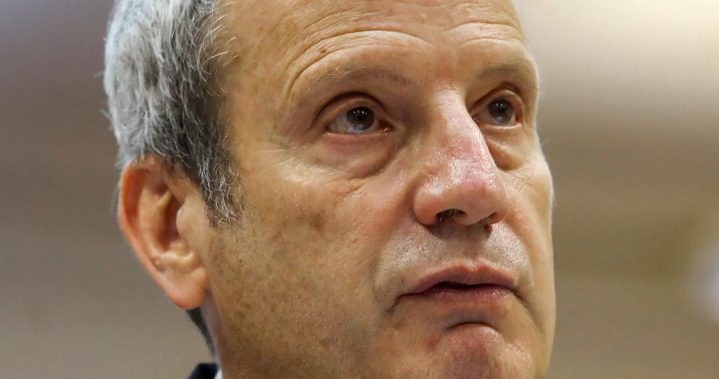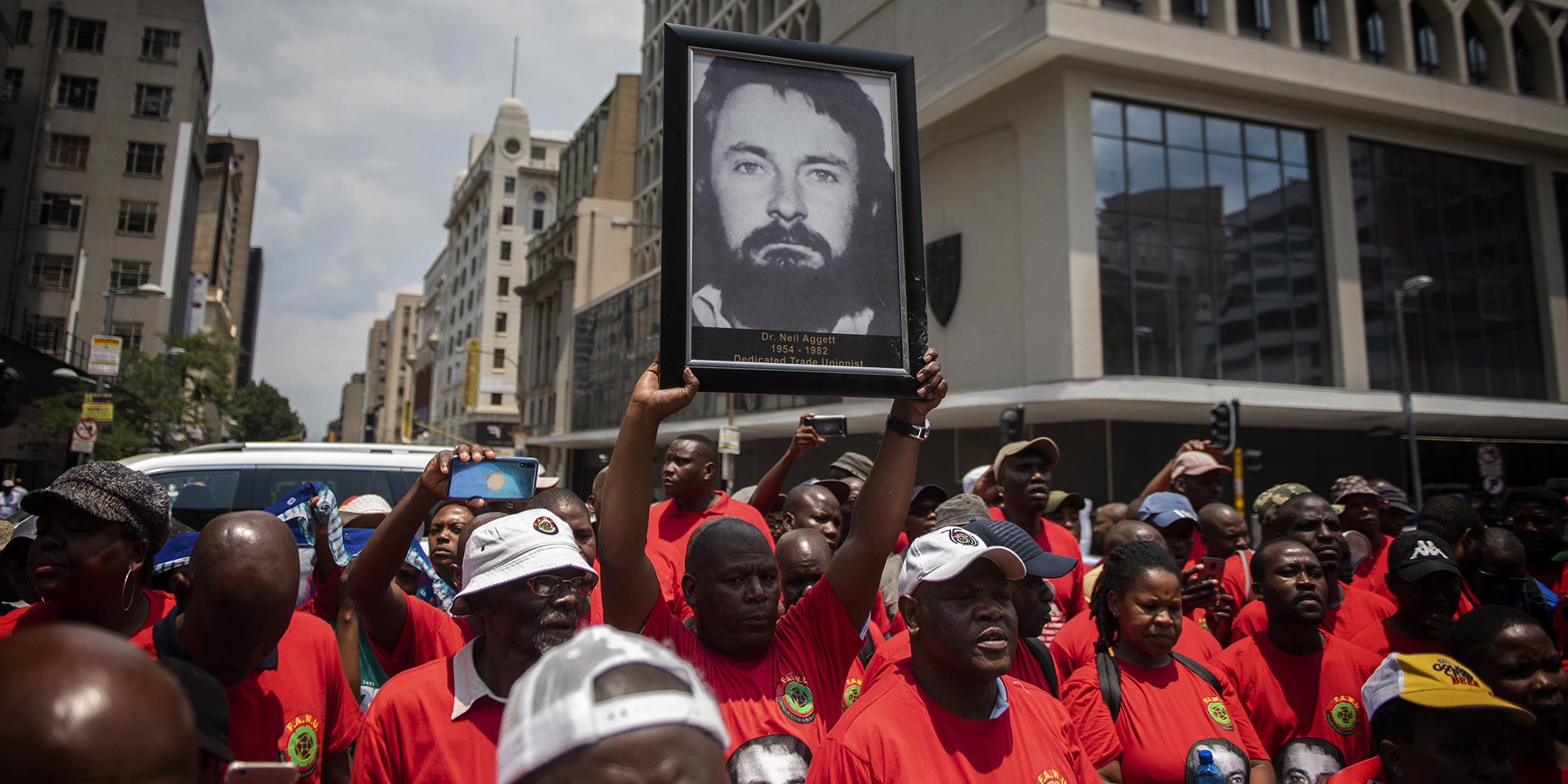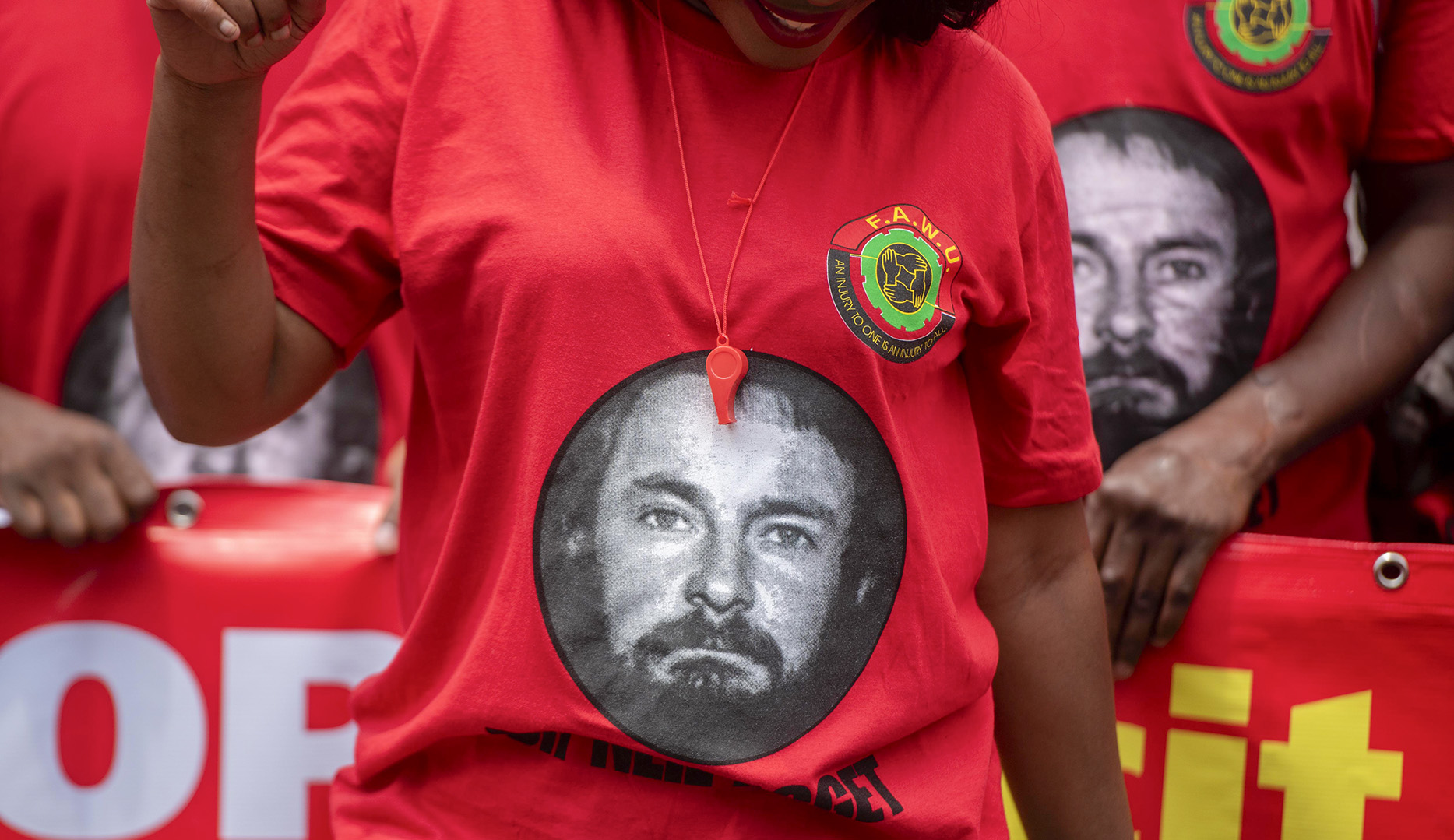NEIL AGGETT MEMORIAL LECTURE
‘Scourge’ of political interference post-TRC suppressed cases of murdered anti-apartheid activists – Advocate Varney

At the Neil Aggett Memorial Lecture on Tuesday, Advocate Howard Varney described political interference as a ‘scourge that many countries have to face’. He added that powerful elements in SA society had ‘shamefully colluded’ to ensure the suppression of cases referred to the National Prosecuting Authority by the Truth and Reconciliation Commission.
Political interference in the wake of the Truth and Reconciliation Commission (TRC) meant that many cases involving the deaths of anti-apartheid activists didn’t “see the light of day” for many years. This included the murder of Dr Neil Aggett at the hands of police officials in 1982, said Howard Varney, a senior programme adviser with the International Centre for Transitional Justice and an advocate of the High Court of South Africa.
Varney spoke at the Neil Aggett Memorial Lecture on Tuesday. The lecture took place at Kingswood College in Makhanda, where Aggett was once a pupil.
“South Africa is a much poorer place without people such as Neil Aggett, Steve Biko, Nokuthula Simelane, Ahmed Timol, Matthew Goniwe, Fort Calata, Imam Haron, Hoosen Haffajee, Ashley Kriel, Rick Turner, Dulcie September, Matthews Mabelane and many others murdered by the Security Branch,” Varney said.
“Their sacrifice has paved the way for our freedoms. In these turbulent times, we could have used their wisdom and guiding hands.”
Varney has been involved in seeking justice for the families of victims of apartheid-era political violence, including the Aggett family.
Neil Aggett was a medical doctor and trade union organiser. On 5 February 1982, he became the first white person to die in detention during apartheid. He was found hanging in his cell at John Vorster Square police station after 70 days in police custody. An inquest in 1982 ruled his death was a suicide.
The inquest was reopened in 2020. Varney said, “It was a real privilege to represent … the Aggett family in the reopened inquest to look into what actually happened to Neil. The Aggett family has endured a long journey to reach some truth and closure. Neil’s parents, Aubrey and Joy, and his brother Michael went to their graves without that closure.”

Food and Allied Workers’ Union members outside the Johannesburg High Court in support of justice for Neil Aggett, who died in died while in detention on 5 February 1982 after being arrested by the apartheid South African Security Police. (Photo: Alet Pretorius / Gallo Images)
In March 2022, Judge Motsamai Makume, who presided over the reopened inquest, found that members of the Security Branch had murdered Aggett and that police officers Stephen Whitehead and Arthur Cronwright — both now deceased — were directly responsible for the murder.
Read more in Daily Maverick: Vindication and victory in Neil Aggett case — while hundreds of other apartheid-era murder cases remain closed
“Lieutenant Stephen Whitehead was … the main tormentor of Neil. He died on 22 April 2019 — ironically, in the same week that the minister of justice announced that the inquest would be reopened. At that time, he was only 62 years old.
“Whitehead and others could have been held to account if the authorities had acted timeously; if they had done their job under law and the Constitution and had not succumbed to political pressure,” Varney said.
“Neil’s memory is treasured by freedom-loving South Africans. He remains an inspiration to young South Africans working to make a difference in society. His contribution to a free and democratic South Africa lives on.”

Fawu members outside the South Gauteng High Court during a march in support of the memory Dr Neil Aggett, who died in detention after being arrested by the South African Security Police. (Photo: Alet Pretorius / Gallo Images)
Justice delayed
Aggett’s case was far from the only one in which the loved ones of a murdered activist went without justice for decades. In its final report, the TRC referred between 300 and 400 cases to the National Prosecuting Authority (NPA) with the request that they should be taken further. These were cases in which the perpetrators had either been denied amnesty or did not apply for amnesty. However, very few of them were ever taken forward.
“We now know why these cases [did not see] the light of day for so many years. It has emerged in recent court cases — and I happened to be involved in all of them — that powerful elements in society shamefully colluded to ensure the suppression of all the cases referred by the Truth [and Reconciliation] Commission to the National Prosecuting Authority,” Varney said.
It was only in recent years, from around 2018 onwards, that this began to change, he continued.
“We have now seen encouraging action on behalf of the NPA, the Directorate for Priority Crime Investigation and the investigation unit of the South African Police Service.”
It is a crime under both the NPA Act and the Prevention of Organised Crime Act to interfere in the work of prosecutors. However, during 2003, an “unofficial moratorium” was imposed on the investigation and prosecution of the cases referred by the TRC to the NPA, Varney said. This moratorium lasted for more than 10 years.
Varney said that when the NPA approached the SAPS and the Directorate of Special Operations in the early 2000s seeking investigators to assist with the TRC cases, they were told by the SAPS that the cases were a “political matter” and that they would need a written instruction from the President to proceed with investigations.
“I want to give you one example of how a case was stopped in its tracks. [It was] an attempt to proceed with an attempted murder prosecution of those behind the poisoning of the Reverend Frank Chikane in the late 1980s. Prosecutor Anton Ackermann … had evidence to show that the Security Branch had attempted to kill Frank Chikane, who was the head of the South African Council of Churches,” Varney said.
According to Varney, in 2004 Ackermann decided to proceed with the case. On the day he was going to affect the arrest of former officers who had been identified as suspects, he received a phone call from a senior official in the Department of Justice.
“[Ackermann] was told, ‘Don’t carry out these arrests.’ And Ackermann, who’s a robust old-time prosecutor that believes in the rule of law, told this official … that he doesn’t take instructions from others, particularly not illegal instructions.
“The official then said, ‘Well, then you’ll hear from your boss.’ And indeed, within a few minutes, the National Director of Public Prosecutions, Bulelani Ngcuka, called Ackermann and told him to down tools and not carry out those arrests.”
The attempted murder case involving Chikane eventually went ahead in 2007, resulting in a plea bargain and suspended sentences handed down to the former minister of police Adriaan Vlok and several others. However, Varney said that four weeks after the conclusion of the case, Ackermann was taken off the TRC cases.
Justice denied
The NPA has previously denied responsibility for failing to investigate and prosecute apartheid-era cases, claiming that political interference from former president Thabo Mbeki’s government was to blame. However, in 2019, the Johannesburg High Court ruled that the NPA had breached the Constitution by allowing such interference to get in the way of prosecutions.
Read more in Daily Maverick:
- NPA blames Mbeki government for failure to prosecute TRC cases
- NPA allowed manipulation of criminal justice system in TRC cases
In 2023, the NPA appointed former TRC member Dumisa Ntsebeza to determine whether anyone should face charges for attempting to block apartheid prosecutions, according to News24. In an opinion released by Ntsebeza and his team in February this year, it was recommended that the NPA should establish an independent commission of inquiry into the political interference it experienced between 2003 and 2017.
Shortly after this, in March, Mbeki released a statement claiming that the executive never interfered with the work of the NPA during the years he was in government.
Statement by former President Thabo Mbeki on allegations of NPA interference by the Executive. pic.twitter.com/PEsjDUKISr
— Thabo Mbeki Foundation (@TMFoundation_) March 1, 2024
“The executive never prevented the prosecutors from pursuing the cases referred to the NPA by the Truth and Reconciliation Commission,” Mbeki stated.
“I insist on this despite a 2021 Supreme Court of Appeal judgment which found, on the strength of uncontested submissions by former National Director of Public Prosecutions advocate Vusi Pikoli, that the NPA ‘investigations into the TRC cases were stopped as a result of an executive decision’ which amounted to ‘interference in the NPA.”
In his address on Tuesday, Varney emphasised that many aspects of the political interference in the TRC cases remained unknown.
“We’ve called for an independent commission of inquiry. We’ve written on multiple occasions to President [Cyril] Ramaphosa, seeking the appointment of a commission of inquiry … with all the proper powers of subpoena…
“All those attempts so far have fallen on deaf ears. And I can tell you, we do intend to take that matter further.” DM




















This is mind boggling. Many of us know that the TRC was a smokescreen…hardly any truth and therefore hardly any reconciliation. People today have to take it upon themselves to do what the TRC tried or never really intended to do. People must learn and educate about the truth and sincerely seek to reconcile SA
But the suppression of cases during a government that was part of the liberation is mind boggling. I guess that’s what happens when money and power talk…when truth is not talking
Those people who died. Those families who lost loved ones. The country that lost out on many great minds and souls. Betrayed by the government they helped bring about…REALY?!
Of course if true, it’ll be made worse by the betrayal of their legacy and country by the perhaps initially misguided but now deliberate and malicious failure of the government they died for
It doesn’t make sense. Please keep digging.
Early on the government was worried about offending right wingers in this country and possibly causing an uprising which would have to be put down by force. This is why, for example, Dimitri Tsafendas was never released and was then buried in an unmarked grave. Can’t be upsetting the Verwoerd family.
There’s also the unpredictable outcomes of these investigations. Maybe people don’t want to take the chance in case of what is uncovered.
Consider the attempt to expose Ngcuka as an apartheid double agent. That led to the unforced and unexpected confession by a lawyer in London that in her days practicing in South Africa she had joined the security police and provided them with information that she got from black anti-apartheid activists who she was representing, and which should have been protected by client-attorney confidentiality.
This let Ngcuka off the hook, but was deeply embarassing to others.
Tough choices. Sounds complicated. Reminds me of accusations around Mama Winnie. Still tough for the victim’s families from their perspectives to make peace with so many inexplicable sometimes black boxes.
Mbeki – he has a lot to answer for.
Okay, I accept that political interference occurred, but who were the forces behind this and, just as important, what were their motivations?
I imagine once the ANC was in power they saw little merit in pursuing these matters – their objective had been achieved. Their own human-rights record was spotty so one may conclude they were happy to avoid the scrutiny.